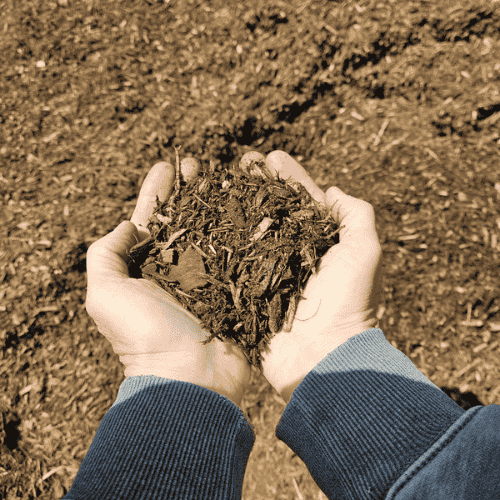
When it comes to landscaping, the materials you choose can make a world of difference—not just in how your yard looks, but also in how it functions and how much maintenance it requires. Two of the most popular choices for ground cover are mulch and stone, and homeowners often find themselves wondering which is better.
The truth is, there’s no one-size-fits-all answer. Both materials have unique benefits and drawbacks, and the best choice depends on your specific landscaping goals, style preferences, budget, and long-term plans.
Let’s break it down.
🌱 What Is Mulch?
Mulch is an organic or inorganic material spread over the surface of the soil. It helps retain moisture, regulate temperature, and suppress weeds. The most common types include:
- Wood chips or shredded bark
- Compost or leaf mulch
- Rubber mulch (inorganic)
Organic mulch, like shredded bark or wood chips, breaks down over time and enriches the soil—making it a great choice for plant health and long-term soil improvement.
🪨 What Is Landscape Stone?
Landscape stone includes a wide range of decorative rock and gravel materials used as ground cover. Common varieties include:
- River rock
- Pea gravel
- Crushed granite
- Lava rock
Stone is inorganic, meaning it doesn’t break down over time. It’s durable, low-maintenance, and excellent for areas that need long-term coverage without frequent replacement.
🆚 Mulch vs. Stone: A Side-by-Side Comparison
Let’s look at how mulch and stone compare in key landscaping categories:
1. Appearance
- Mulch provides a rich, earthy look that complements natural surroundings. It can give garden beds a warm, well-maintained appearance.
- Stone offers a sleek, modern look and comes in a variety of colors, textures, and sizes for more customized visual appeal.
✅ Winner: Tie. It depends on your style preferences—natural vs. modern.
2. Weed Control
- Mulch helps suppress weeds by blocking sunlight, especially when applied in a thick layer (2–4 inches).
- Stone, when installed with proper landscaping fabric underneath, is excellent for long-term weed prevention.
✅ Winner: Stone (with landscape fabric)
3. Moisture Retention
- Mulch excels at retaining moisture, keeping roots cooler and more hydrated, which is especially helpful during hot summers.
- Stone can actually heat up and increase soil temperature, leading to quicker evaporation in planting beds.
✅ Winner: Mulch
4. Soil Health
- Mulch, especially organic types, breaks down and improves soil quality over time by adding nutrients.
- Stone does not interact with the soil—it offers no benefits in terms of fertility or structure.
✅ Winner: Mulch
5. Maintenance
- Mulch needs to be replenished every 1–2 years as it decomposes or fades.
- Stone is more of a “set it and forget it” material. Once properly installed, it can last for decades.
✅ Winner: Stone
6. Cost
- Mulch generally has a lower initial cost, making it more budget-friendly upfront.
- Stone costs more initially due to material and installation, but requires less frequent replacement.
✅ Winner: Mulch (short-term), Stone (long-term)
7. Environmental Impact
- Mulch, being biodegradable, is eco-friendly and promotes sustainable gardening.
- Stone, while natural, has a heavier carbon footprint due to mining and transportation processes.
✅ Winner: Mulch
🌼 Best Uses for Mulch
Mulch is ideal for:
- Flower beds and vegetable gardens
- Tree rings and shrub areas
- Moisture-sensitive plants
- Temporary or seasonal garden beds
It’s also the go-to option if you’re looking to improve your soil over time or want something that’s easy to install and remove.
🏡 Best Uses for Stone
Stone is great for:
- Walkways and driveways
- Drainage areas and dry creek beds
- Permanent landscape features
- Low-maintenance zones and xeriscaping
- Around structures like patios or pools
If you’re looking for long-term durability and minimal maintenance, stone is the superior choice.
💡 Pro Tip: Combine Both for the Best Results
Many homeowners and landscape designers combine mulch and stone for a layered look and balanced performance. For example, use mulch around your plants and shrubs for soil enrichment and moisture retention, and use stone for walkways, borders, or decorative sections that don’t require frequent watering.
This combination offers both beauty and practicality, giving you a versatile, low-maintenance landscape design.
🛒 Where to Buy Mulch and Stone in New Jersey
If you’re located in northern New Jersey and looking for premium mulch or stone, Kirk Allen Landscape Supply is your trusted source.
They offer a wide selection of:
- Natural bark mulch
- Dyed mulch (black, brown, red)
- Decorative stone (river rock, gravel, crushed stone)
- Topsoil, sand, and more
Their team can also help you figure out how much material you need and recommend the best type for your specific project.
📞 Need Help Deciding? Contact Kirk Allen Landscape Supply
Still unsure whether mulch or stone is right for your yard? Let the experts at Kirk Allen Landscape Supply help. Whether you’re a homeowner, contractor, or landscaper, they have the materials and experience to support your project from start to finish.
📍 Address: Visit Website
📞 Phone: 973-347-3117
🌐 Website: https://www.kirkallenlandscapesupply.com
🔚 Final Thoughts
When choosing between mulch and stone for your landscape, there’s no wrong answer—only the solution that best fits your needs, your yard, and your style. Mulch is organic, plant-friendly, and ideal for garden health. Stone is long-lasting, low-maintenance, and perfect for areas where you want a permanent finish.
Still not sure? Talk to the pros at Kirk Allen Landscape Supply and get expert guidance today!

